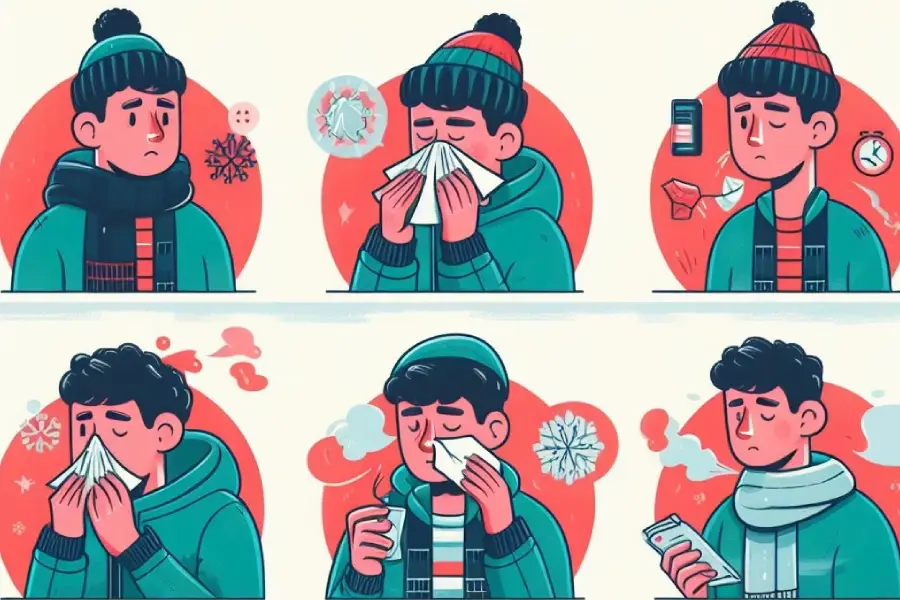
How to Prevent Nosebleeds in Winter: 7 Effective Tips
How to Prevent Nosebleeds in Winter. As the weather turns colder and the humidity drops, nosebleeds become a common nuisance. While mostly harmless, frequent nosebleeds can be concerning and frustrating. Luckily, with simple preventative measures, you can say goodbye to surprise nosebleeds this winter. Read on to learn tips and tricks to prevent nosebleeds in winter.
Contents
Why Do Noses Bleed More in the Winter?
Understanding how to prevent wintertime nosebleeds helps to understand what causes them in the first place. The most common culprits are dry air and irritation.
During the winter, cold outdoor air combines with indoor heaters to create dry air. This parches and dries out the sensitive mucous membranes lining the nasal cavity. Dryness leads the mucous membranes to crack and bleed when disturbed.
Frequent nose blowing from colds or allergies can also damage the tender tissues inside the nose, causing bleeding.
The drier the air, the more likely these everyday irritations will injure your nasal membranes enough to make them bleed. That’s why nosebleeds happen more often when humidity is low in winter.

How to Prevent Nosebleeds in Winter
Keeping your skin moisturized and avoiding irritation can help prevent painful nosebleeds from erupting. Consider these tips to keep your nose in top shape this winter:
Use a Humidifier
Running a humidifier is one of the best ways to combat winter dryness that leads to nosebleeds. The humidifier increases moisture in the air, which helps hydrate and protect nasal membranes.
Aim to keep indoor humidity around 30%-50%. This is humid enough to be comfortable without promoting mold growth. Be sure to clean your humidifier regularly to prevent buildup of minerals or microbes.
Moisturize With Ointments
The thin layer of soothing ointments like petroleum jelly or antibacterial bacitracin in the nasal openings creates a protective barrier against dryness. Reapply after showering or heavy nose blowing.
Avoid overusing nasal moisturizers for over a few days, as this can increase irritation. Talk to your doctor about long-term solutions if your nose requires intensive moisturizing.
Stay Hydrated
Drinking plenty of water keeps your body and nasal membranes hydrated from the inside out. Aim for the recommended minimum of 64 ounces (1.9 liters) of daily water.
Hydrating foods like fruits, vegetables, and broth-based soups also help. Avoid alcohol and caffeine, which have a dehydrating effect.
Breathe Through Your Nose
Breathing through your nose warms and humidifies the air before it reaches your dry nasal tissues. Mouth breathing bypasses this natural humidifying effect.
Keep your mouth closed and breathe through your nose as much as possible indoors and outdoors. If you must breathe through your mouth, drink more water and use nasal moisturizing treatments.
Manage Allergies and Colds
Allergy symptoms and colds often provoke nose-blowing, which can rupture blood vessels. Treat seasonal allergies proactively with medication and air filters to prevent excessive nose irritation.
Use saline rinses and humidifiers to ease congestion and lubricate your nasal passages for colds. Blow your nose gently to avoid damage. Keeping your immune system strong with rest, fluids, and nutrition can help reduce sickness.
Use a Nasal Moisturizing Ointment
Dabbing a thin layer of moisturizing ointment inside your nostrils creates a protective barrier against dry air. Petroleum jelly, vitamin E oil, and antibacterial ointments work well. Avoid overuse and talk to your doctor about long-term solutions if your nose requires moisturizing.
Avoid Aggressive Nose Picking
While satisfying, digging vigorously in your nose can rupture delicate blood vessels and lead to bleeding. Keep your fingers away from your nose as much as possible, or be gentle when necessary.

Seek Medical Help for Frequent or Heavy Nosebleeds
While most nosebleeds are harmless, recurrent or heavy bleeding may indicate a more serious medical issue. See your doctor if you experience:
- Nosebleeds several times a week
- Bleeding that lasts longer than 20 minutes
- Large amounts of blood loss that makes you dizzy or weak
- Bleeding along with bruising around the nose and eyes
Diagnostic tests can identify if an underlying health condition or nasal structural problems are causing chronic nosebleeds. In some cases, additional treatments like prescription nasal ointments, cauterization, or surgery may be required. Don’t hesitate to get checked out for peace of mind.
Breathe Easy All Winter with These Handy Tips
With dry winter air descending, simple precautions can help prevent painful, messy nosebleeds from disrupting your day. Humidify the air, hydrate from the inside and out, avoid nose irritation, and handle your schnoz carefully. Your nose will thank you!
Implementing these handy nosebleed prevention tips can help you breathe easy all season long. No more blood-stained tissues or sudden nose gushers means more time enjoying all the fun things winter offers. Just keep up the nasal TLC and leave the aggressive nose-picking behind. Here’s to a winter with happy, leak-free noses for everyone!